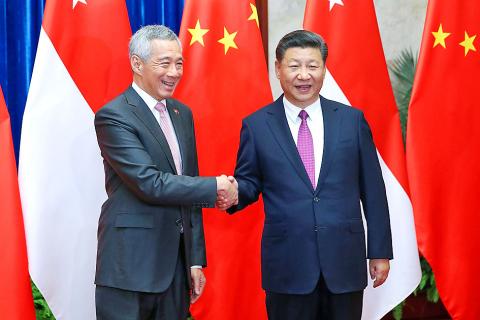The Presidential Office yesterday declined to comment on media reports that Singapore would stop sending troops to Taiwan to participate in a long-running joint military exercise, saying only that the government greatly values its friendship with Singapore.
“The government greatly values its long and strong friendship with Singapore. The Presidential Office has no comment on baseless news reports,” Presidential Office spokesman Alex Huang (黃重諺) said in response to media requests for comment on Singapore’s rumored plan to end military exchanges with Taiwan.
Ministry of National Defense spokesman Major General Chen Chung-chi (陳中吉) also declined to comment on the news, calling it speculation.

Photo: AFP
In 1974, then-president Chiang Kai-shek (蔣介石) agreed to then-Singaporean prime minister Lee Kuan Yew’s (李光耀) request for the Singaporean military to be trained by the Republic of China’s armed forces in Taiwan due to the city-state’s limited space.
Chiang’s son, then-premier Chiang Ching-kuo (蔣經國), in 1975 signed an agreement with Lee and initiated the partnership, codenamed “Project Starlight” (星光計畫), in which Singapore sent troops to Taiwan to receive military training.
The project has continued to this day and has taken on the form of a joint military exercise after Taiwan helped the Singaporean military develop its defense capabilities.
Former deputy minister of national defense Lin Chong-pin (林中斌) yesterday said word of the rumored plan was passed on to him by a reporter in Hong Kong.
If true, the significance behind Singapore’s decision to end its military exchanges with Taiwan following a meeting between Chinese President Xi Jinping (習近平) and Singaporean Prime Minister Lee Hsien Loong (李顯龍) would be “self-explanatory,” Lin added.
Democratic Progressive Party Legislator Tsai Shih-ying (蔡適應) yesterday said there have been several signs that Singapore would back out of Project Starlight.
The most obvious reason is that China has been pressuring Singapore to end its military exchanges with Taiwan to limit the nation’s international space, he said.
That Singaporean troops receiving training in Taiwan was a topic of discussion between Xi and Lee Hsien Loong was likely a hint that the speculation is true, Tsai said, adding that joint military drills by Taiwan and Singapore have been protested by Taiwanese.
The Singaporean government has invested A$2.2 billion (US$1.75 billion) to build a military base in Queensland after it signed the Comprehensive Strategic Partnership agreement with Australia and has set plans in motion to move its troops from Taiwan to Australia, where there would be more space to conduct military drills, he said.
Tsai said while he hopes that Singapore would maintain a level of military exchanges with Taiwan, he could understand why the Singaporean government might feel that it is “inconvenient” to continue training its armed forces in Taiwan, given the circumstances.

CHIP WAR: The new restrictions are expected to cut off China’s access to Taiwan’s technologies, materials and equipment essential to building AI semiconductors Taiwan has blacklisted Huawei Technologies Co (華為) and Semiconductor Manufacturing International Corp (SMIC, 中芯), dealing another major blow to the two companies spearheading China’s efforts to develop cutting-edge artificial intelligence (AI) chip technologies. The Ministry of Economic Affairs’ International Trade Administration has included Huawei, SMIC and several of their subsidiaries in an update of its so-called strategic high-tech commodities entity list, the latest version on its Web site showed on Saturday. It did not publicly announce the change. Other entities on the list include organizations such as the Taliban and al-Qaeda, as well as companies in China, Iran and elsewhere. Local companies need

CRITICISM: It is generally accepted that the Straits Forum is a CCP ‘united front’ platform, and anyone attending should maintain Taiwan’s dignity, the council said The Mainland Affairs Council (MAC) yesterday said it deeply regrets that former president Ma Ying-jeou (馬英九) echoed the Chinese Communist Party’s (CCP) “one China” principle and “united front” tactics by telling the Straits Forum that Taiwanese yearn for both sides of the Taiwan Strait to move toward “peace” and “integration.” The 17th annual Straits Forum yesterday opened in Xiamen, China, and while the Chinese Nationalist Party’s (KMT) local government heads were absent for the first time in 17 years, Ma attended the forum as “former KMT chairperson” and met with Chinese People’s Political Consultative Conference Chairman Wang Huning (王滬寧). Wang

CROSS-STRAIT: The MAC said it barred the Chinese officials from attending an event, because they failed to provide guarantees that Taiwan would be treated with respect The Mainland Affairs Council (MAC) on Friday night defended its decision to bar Chinese officials and tourism representatives from attending a tourism event in Taipei next month, citing the unsafe conditions for Taiwanese in China. The Taipei International Summer Travel Expo, organized by the Taiwan Tourism Exchange Association, is to run from July 18 to 21. China’s Taiwan Affairs Office spokeswoman Zhu Fenglian (朱鳳蓮) on Friday said that representatives from China’s travel industry were excluded from the expo. The Democratic Progressive Party government is obstructing cross-strait tourism exchange in a vain attempt to ignore the mainstream support for peaceful development

ELITE UNIT: President William Lai yesterday praised the National Police Agency’s Special Operations Group after watching it go through assault training and hostage rescue drills The US Navy regularly conducts global war games to develop deterrence strategies against a potential Chinese invasion of Taiwan, aimed at making the nation “a very difficult target to take,” US Acting Chief of Naval Operations James Kilby said on Wednesday. Testifying before the US House of Representatives Armed Services Committee, Kilby said the navy has studied the issue extensively, including routine simulations at the Naval War College. The navy is focused on five key areas: long-range strike capabilities; countering China’s command, control, communications, computers, cyber, intelligence, surveillance, reconnaissance and targeting; terminal ship defense; contested logistics; and nontraditional maritime denial tactics, Kilby